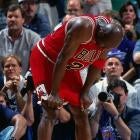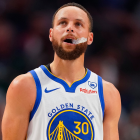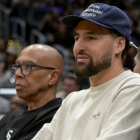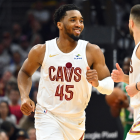Questioning the greatness of Michael Jordan is a fool's errand that only the smarmiest of hot-take edgelords would dare consider doing. Yet, one of Jordan's greatest physical accomplishments has been the subject of 'well actually-ing' and speculation since, well, the moment it ended.
We're talking, of course, about the "flu game." For the uninitiated, this moment of glory came in Game 5 of the 1997 NBA Finals where a physically debilitated Jordan was able to put together a herculean effort, overcome an ailment that had him curled up in a fetal position and vomiting until the early hours of the morning, and help guide the Chicago Bulls to a 90-88 win over the Utah Jazz.
The performance not only belongs on the Mt. Rushmore of Jordan's career, but it also belongs in the pantheon of the greatest single-game performances in NBA history. But how much do we actually know about that famous June evening?
Here are the facts that we can absolutely verify to be true: Jordan did not attend a breakfast he scheduled with Scottie Pippen and Ron Harper the morning of the game. Jordan missed his team's shoot-around prior to the game. Jordan arrived at the Delta Center in Salt Lake City just after 5 pm and spent pregame in a dark room vomiting before telling coach Phil Jackson he was ready to play. Jordan looked physically awful throughout the game but ultimately scored 38 points, including the game-icing shot, to help his team win and take a 3-2 series lead.
Turns out, there's a lot we know about the game itself, and some moments beforehand, but if you'll notice in that description, not once was a specific illness mentioned. That's because the story itself has evolved a bit over the years since that 1997 game, and the mythology alongside it has helped muddle some of the details surrounding it.
Here at CBS Sports, we explore how the "flu game" came to be both in terms of name, and physical cause within Michael Jordan himself.
June 11, 1997
Let's go back to the date in question. Footage from the broadcast of the game shows that Jordan's health was already the story going into Game 5. Then-play-by-play broadcaster for NBC Sports Marv Albert kicked things off by saying the Bulls guard was suffering from "flu-like symptoms." Albert adds that Jordan had spent all day in bed, did not eat all day, did not attend shoot-around before the game and his status was "uncertain."
After Jordan was introduced in the team's starting lineup, reporter Ahmad Rashad gave further details to Jordan's symptoms. Rashad said he had a stomach ache, a headache, threw up all night, stayed in bed all day and threw up all day then. The vomiting continued as he spent time in a dark room prior to the game.
Throughout the game, some version of those lines were repeated ad nauseam by the broadcasters, with the word "flu" likely having been forever imprinted onto the brains of the viewing public. But even as in sports columns that were printed as early as the next day, such as the one Bernie Lincicome wrote for the June 12, 1997 edition of the Chicago Tribune, the notion of Jordan suffering from the flu seemed to have already been dispelled.
Per the column:
Whatever Jordan ate that disagreed with him, whatever mountain bug got up his nose, whether it was flu or fatigue or frustration, the officially diagnosed viral gastroenteritis, or whether it was a grand ruse, it ought to be passed around to the rest of the Bulls, who now need to win only one game at home to finish the Drive for Five.
Lincicome expresses more healthy skepticism towards the ailment later on in the column saying if Jordan was acting exhausted and physically debilitated, it was a better performance than the one he gave in Space Jam. More importantly than that, however, is how the gastroenteritis was known to be what team staff claimed Jordan's ailment was.
There was another theory that speculated that Jordan was suffering a form of altitude sickness. The hyper-vigilant fact-checking crew at The New Yorker allowed the following sentence to run in a 1998 story by David Halberstam: "Whether it was altitude sickness or food poisoning no one was ever quite sure."
As for the phrase "flu game" itself, a cursory search on Newspapers.com reveals the term's first use in a Chicago Tribune article published on June 16, 1998, but I digress.
That story seemed to last for quite some time and it wasn't until nearly 14 years later that some more details about the evening began to emerge.
2012-2013
On Feb. 28, 2012, ESPN published an interview with Phil Jackson where David McMenamin talks to the former Bulls coach about that fateful performance from Jordan in 1997. By this point in popular culture, the legend of the "flu game" had grown to a Paul Bunyan-esque tale that served as a legendary example of Jordan's competitive spirit. Nike had turned the performance into a commemorative re-release of the Jordan XII shoe, and Gatorade turned Jordan's determination to overcome his illness into the theme of a commercial released earlier in 2012.
That was pretty much the springboard for the Jackson interview. While Jordan's former coach recounts the details of that day, one thing he seems to mention off-handedly is his belief of what caused the alleged food poisoning.
"Well, I thought he got better as the game went along. We got behind in the second quarter and came back and so we were kind of in better spirits at halftime. Like we had a, 'This is going to go all right,' type of thing. So, I talked to Chip about it and reflecting about it with my trainer, my trainer said, 'I think coming back down out of altitudes helped him. I think some of his headaches [subsided].'
"Harper always said that it was bad pizza. You know, Ronnie Harper always thought it was a bad food type of thing. But, the headaches are associated with altitude."
Fast forward to April 2013, and Jordan's trainer, Tim Grover, further implicated the pie-based source of Jordan's physical woes. Here, Grover recounts the story that eventually made it onto "The Last Dance."
"Yes, 100 percent poisoned for ('the flu game')," Grover said on TrueHoop TV. "Everyone called it a 'flu game,' but we sat there and we were in the room, we were in Park City, Utah, up in a hotel. Room service stopped at like 9 o'clock. And he got hungry, and we really couldn't find any other place to eat so we ordered ... I said, 'Hey, the only thing I could find is a pizza place.' He said, 'All right, order pizza.' We had been there for a while, so everybody knows what hotel ... I mean Park City (didn't have) many hotels back then. Everybody kind of knew where we were staying.
"So we order a pizza, they come to deliver it, five guys come to deliver this pizza. And I'm just ... I take the pizza, and I tell them, I said, 'I got a bad feeling about this.' I said, 'I just got a bad feeling about this.' Out of everybody in the room, he was the only one that ate. Nobody else ... then 2 o'clock in the morning, I get a call to my room. I come to the room, he's curled up, he's curled up in the fetal position. We're looking at him. We're finding the team physician at that time. And immediately I said, 'It's food poisoning.' Guaranteed. Not the flu."
It's, of course, worth noting that the hypothesis Grover gives at the time is not from a doctor of internal medicine, but it seems to be the story that those in Jordan's camp have run with. That being said, it wasn't the first theory floated around about the "flu game" in 2013.
In February, a blog post on the now-defunct site Lost Lettermen recounted a since-deleted Reddit post that claims former NBA star Jalen Rose made his way to a college party and told stories of his playing days. The most relevant of the bunch is the claim that Jordan was actually dealing with a hangover. Rose was vague about denying the quotes after those details were published, telling MLive.com, "I'm saying they weren't quotes."
The Last Dance and beyond
This now brings us to the ninth episode of "The Last Dance," which rehashed the "flu game" and allowed a creative project that Jordan had complete authority over to tell what Jordan wants people to think the truth was. He even made himself look less flattering to help sell the story and admitted to eating the whole bad pizza himself.
Naturally, those watching the episode and tweeting their thoughts about it were rather skeptical about the whole issue, but once the story made its way to a larger audience, those who claimed to be responsible for the pizza stepped forward. First, there was the man who claimed to be an assistant manager of a Pizza Hut in Park City, Utah at the time and claimed that he made the pizza himself. He shot down the food poisoning theory because of his meticulous approach to making it, and the fact that he had the delivery driver take him to Jordan himself -- implying that the store knew it was THE Michael Jordan himself getting the pie, which seems insane.
Not a day later, and that story was called a crock. A man named Otto from Park City talked to Rich Eisen, said his buddy was a bartender at the "actual" restaurant the pizza came from, and added his friend has repeated the story nonstop since that day. In that retelling, it was the restaurant's owner who delivered the pizza, they had just delivered $3,000 worth of alcohol to the room the day before, and the store is no longer in business. But, again, this is just what this dude claims.
It's been nearly 23 years since one of the greatest moments in the career of arguably the greatest player of NBA history, and fans are no closer to the truth today than they were over two decades ago. But the mystique and mythology of the performance still remains as strong as ever. It's a game that will continue to be used as something to cement Jordan's status as the GOAT, serve as evidence as to why Jordan is tougher than LeBron James among the Sisyphus wannabes who continue to hash out that debate, and be a source of mystery among basketball fans of how it really came to be. Throughout it all, one opinion will stay the same: the game was impressive as hell.

















